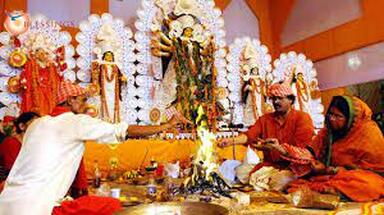|
Chapter 16, Vidhyeshwara Samhita of Shiva Purana elaborates the importance of Puja of deities. The word puja is derived from “Puh” means “the achievement of the fruit of enjoyment”. By the rite one achieves the fruits. Jayate means “is born.” Worldly fruits and perfect knowledge are achieved from “Puja” done with desires and desireless respectively.
The daily and occasional rites yield their benefits in due course but fruits of kamya rites (rites with wish) are instantaneous. The necessary rites are performed every day. The occasional rites are performed in particular months, fortnights or years or on special occasions. In kamya rites one derives the fruits after the sin is duly quelled. shlokas (chapter 16 shlokas 29-31) Categories of Sacrifices: Rudra-saṃhita (Srishti-khaṇḍa Chapter 12) of Shiva Purana has broadly classified sacrifices done by the devotee in three categories:
The Tapo yajna (sacrifice in the form of penance) is far superior to thousands of Karmas yajnas (ritualistic sacrifices). The Japa yajna (sacrifice in the form of Japas) is far superior to thousands of Tapo yajnas (sacrifices in the form of penance). There is nothing superior to Dhyana yajna (meditation) which is the cause of true knowledge, since the yogin is able to see his favourite (deity) of equanimity through meditation. (45-46) Linga is of two types: the exterior and the interior. The exterior is gross and the interior is subtle. Those who are engaged in ritualistic sacrifices and do regularly worship the gross Linga are unable to steady the mind by meditating upon the subtle and hence they use the gross Linga. He who has not mastered the Linga of the mind, the subtle one, must perform the worship in the gross Linga and not otherwise. The pure undying subtle Linga is ever perceived by the masters of true knowledge in the same manner as the gross one is thought to be very excellent by those who are not yogis. Till the realisation of perfect knowledge, a man should continue the ritualistic worship of Shiva. (51-54, 58) Having an idol is very auspicious for a person who has no such knowledge. It is a ladder that enables him to climb to a higher position. It is very difficult to climb to a position without a support. The idol is only a means to achieve the Nirguṇa Shiva. The attainment of the Nirguṇa through a Saguṇa is certainly possible. In this manner, the symbols of all lords are conducive to a steady faith and belief. Till the realisation of true knowledge, the idol shall necessarily be worshipped. If any one does not worship the idol before he attains perfect knowledge, his downfall is sure. (63-67) Worship should be performed with devotion. Without worship and charitable gifts, sin cannot be kept at bay. As long as there is a vestige of sin in the body, achievement need not be expected. When the sin is wiped off, all rites will bear fruit. (69-70) The root of true knowledge is unswerving devotion. The root of knowledge too is devotion. The root of devotion is good action and the worship of one’s own favourite deity. The root of that is the good preceptor. A good preceptor is secured only through association with good people. If one associates with good people, one will come across a preceptor. From the preceptor mantras and the modes of worship can be learned. Bhakti (devotion) is generated by worship and it gives birth to knowledge. Knowledge leads to perfect knowledge and realisation of the supreme Brahman. When there is perfect knowledge, differentiations cease altogether. When differentiation ceases, the misery of mutually clashing opposites vanishes. He who is free from the tangle of opposites and the miseries attendant on them assumes the form of Shiva. (73-77) As long as the person continues the life of a householder, he shall perform the worship of the idols of the most excellent of the five deities (Ganesh, Sun, Vishnu, Shiva and Devi) with pleasure. Or it is enough if Shiva alone is worshipped. if Shiva is worshipped, all the gods are worshipped. (82-83) Processes or Services of Puja: Vidhyeshwara Samhita in Shiva Purana have explained various process or services of puja to attain the fruits with reference to Shiva Puja. The same processes of puja are relevant for other deities:
The worship of idols made of clay etc. is conducive to attainment of all cherished desires in the world. Sit in lotus pose and worship respectfully. The five deities Ganesh, Sun, Vishnu, Parvati and Shiva shall be usually worshipped (chapter 16 shlokas 3- 22).
Reference: Chapters 3.4,5 6, 16 & 17, Vidhyeshwara Samhita, Chapter 12 Rudra-saṃhita (Srishti-khaṇḍa) of Shiva Purana
0 Comments
|
Archives
July 2024
Categories |

 RSS Feed
RSS Feed